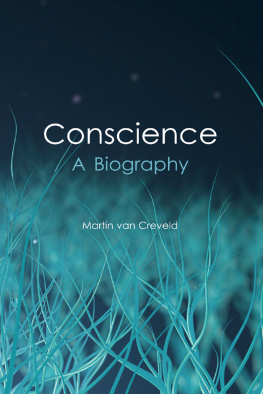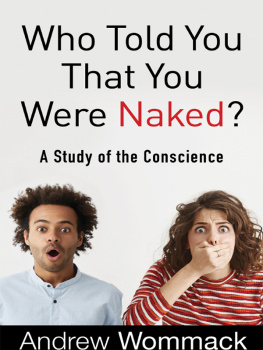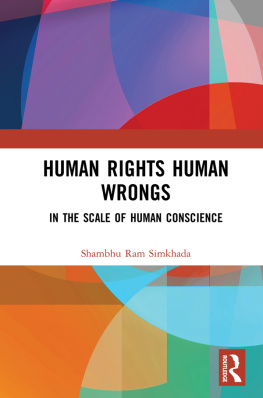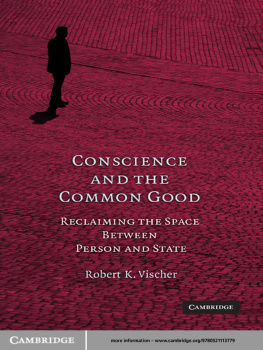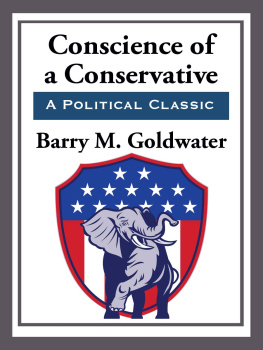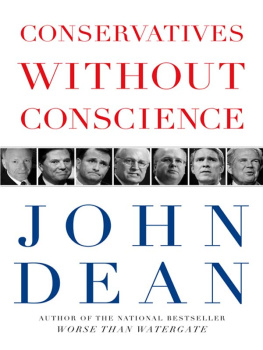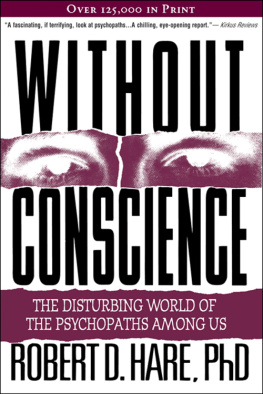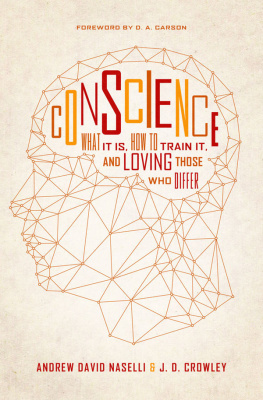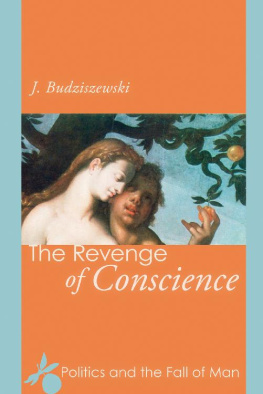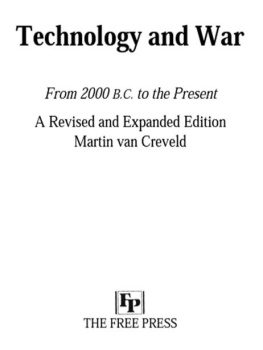CONSCIENCE

Conscience
A Biography
Martin van Creveld
REAKTION BOOKS
For Benda, a true friend in need
Published by Reaktion Books Ltd
33 Great Sutton Street
London EC1V 0DX, UK
www.reaktionbooks.co.uk
First published 2015
Copyright Martin van Creveld 2015
All rights reserved
No part of this publication may be reproduced, stored in a retrieval system, or transmitted, in any form or by any means, electronic, mechanical, photocopying, recording or otherwise, without the prior permission of the publishers
Page references in the Photo Acknowledgements and
Index match the printed edition of this book.
Printed and bound in Great Britain
by TJ International, Padstow, Cornwall
A catalogue record for this book is available from the British Library
eISBN: 9781780234618
Contents
Introduction
As a Jew, an Israeli and the son of Holocaust survivors, several of whose relatives were killed during the German occupation of the Netherlands in 194045, I have long been interested in the following question: did the Nazis, especially those who ordered and perpetrated mass murder, have a conscience? Was there anything they did simply because they considered it good? Was there anything so evil that it made them shrink? Is there any indication that, either during or after the event, they were tormented by remorse? If not, and given that many of us see conscience as the factor that separates man from the beasts, does this mean that they were somehow other than human? Is it possible that, coming out of God knows where, there suddenly appeared a group of people so essentially different from what we believe ourselves to be as to almost form a different species? If so, how did such a thing happen? Since it happened once, could it happen again?
Conscience should not be confused with morality: that is, the ability to distinguish between good and evil. Rather, it is that part of the human soul, built-in or acquired, that makes us behave and act on the basis of that distinction. It is also that which, if we have already committed an act we judge as evil and not good, makes us experience guilt, remorse and regret. It keeps us awake at night, gnaws at us and gives us no rest. Unless the act has been repented and/or atoned for, it can result in severe psychological problems. As Shakespeare put it in Richard III (I:iv):
it makes a man a coward. A man cannot steal but it accuseth him; a man cannot swear but it checks him; a man cannot lie with his neighbours wife but it detects him. Tis a blushing shame-faced spirit that mutinies in a mans bosom. It fills a man full of obstacles; it made me once restore a purse of gold that by chance I found. It beggars any man that keeps it; it is turned out of towns and cities a dangerous thing; and every man that means to live well endeavours to trust to himself, and live without it.
Reader note, these are the words of a professional murderer a hitman, as we would say employed by the king to get rid of his enemies. For him, it is what urges those who have it to respect social norms, as he occasionally did. However, there is another face to the matter. Given the right circumstances it can, and sometimes does, make some of us act against those norms, even to the point of trying to demolish them and blow them right into the stratosphere.
Negative or positive, conscience does all this, or at any rate is supposed to do all this, regardless of whether the act in question was known to ourselves alone or to others too; of whether it succeeded or ended in failure; and of any reward or punishment that did, or did not, follow. It does so, in other words, regardless of the cost its owner may incur. Strictly speaking, a conscience that takes cost into consideration is not a conscience at all. A conscience that meets these conditions may be rarer than diamonds. However, it does exist. To paraphrase the great eighteenth-century British philosopher David Hume (17111776), conscience is the bridge between the world that is and the world that, on the basis of what is normally known as the contrast between good and evil, we feel should have been or should be.
At first I thought I would limit my enquiries to the Third Reich. Later I changed my mind and decided to delve into the subject as a whole. But I still wanted to devote a special chapter to the Nazis. This was because their crimes, by almost universal consent, were perhaps the worst of all, so their consciences, if they had such a thing, could be used as a kind of measuring stick for the rest. But where to start? Is conscience an invention? If so, who invented it, when, where, how and to what purpose? What social need did its invention meet, and how did it interact with other elements of human culture such as religion, philosophy, state power and psychology? Is it limited to civilized peoples belonging to the higher races, as many Western people believed, at least until 1945? Or is it something all human beings, by virtue of being human, have or at least are capable of having? What are we to make of the many peoples including, as we shall see, Jews until the end of the nineteenth century whose language does not have a word for it? Do non-Western civilizations share our ideas of it? How to account for those, such as the above-mentioned Nazis, who have shown few signs of having it? Taking 1945 as the starting point of the modern world, what has happened to conscience since then? Given current advances in robotics on the one hand and in neuroscience on the other, does conscience have a future and, if so, of what kind?
To make things more complicated still, some modern ethologists have suggested that certain animals also show signs of having something like a conscience. The tone was set by Charles Darwin. In The Descent of Man (1871), Darwin raised the following question. Suppose life is indeed a struggle for existence in which the fittest come out on top: how then did the faculties that restrain that struggle, such as empathy, altruism and morality, evolve and maintain themselves? In response, he wrote:
The following proposition seems to me in a high degree probable namely, that any animal whatever, endowed with well-marked social instincts, the parental and filial affections being here included, would inevitably acquire a moral sense or conscience, as soon as its intellectual powers had become as well, or nearly as well developed, as in man...
I do not wish to maintain that any strictly social animal... would acquire exactly the same moral sense as ours. [Yet an] inward monitor would tell the animal that it would have been better to have followed the one impulse rather than the other. The one course ought to have been followed, and the other ought not; the one would have been right and the other wrong...
It has often been assumed that animals were in the first place rendered social, and that they feel as a consequence uncomfortable when separated from each other... but it is a
Such a conscience is essential for any kind of animal that, first, raises its young and, second, lives in the company of others of its kind. Many other biologists, evolutionists and ethologists have addressed the issue, with no very great success. On the contrary: the deeper we penetrate into the microscopic mechanisms that govern the heredity and evolution of all living creatures, the more baffling the problem.
For example, a famous book by a well-known present-day biologist describes the way in which heredity and evolution is dominated by selfish genes. Genes are packets of DNA, a material that carries the heredity of a living organism whose one wish in its life is to replicate itself. The volume in question does not mention conscience even in the index. Can a gene have a conscience? Certainly not in anything like the ordinary sense of the term. To return to Humes definition of conscience, it seems to presuppose four things. The first is an understanding of the self as a separate entity what is commonly known as consciousness. The second is knowledge of the world in which that self exists and operates; the third, an understanding of the difference between good and evil; the fourth, freedom to use conscience as the basis for connecting the two. All these are things bits of matter cannot have. Or can they?

